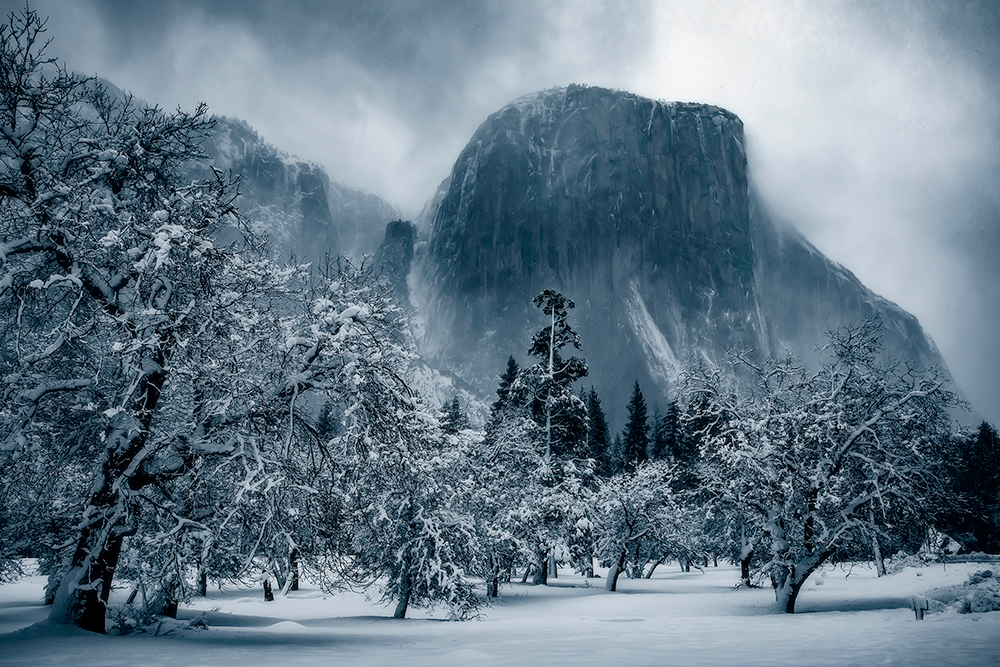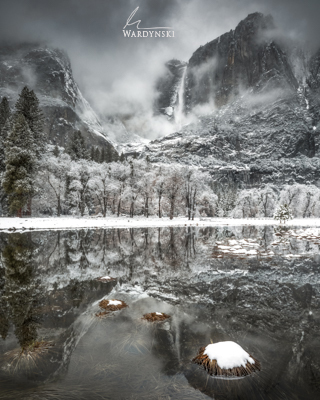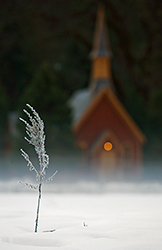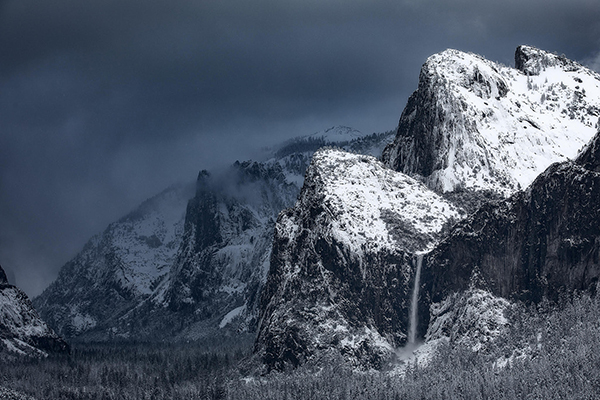Yosemite Winter Landscape Workshop
Authorized permittee of the National Park Service
|
Photos from the last workshop
|

"
What a wonderful weekend this was in so many ways!
I have years of photography experience and still came away from this workshop with new skills and feel it was well worth every penny! - Lisa Chadwick
"  Yosemite is California's premier National Park....and in our opinion, it's at its best with its winter coat on. Late winter is an absolute landscape photographers paradise. The towering granite peaks are still covered in snow....providing amazing options for photographing in color, or in monochrome. The Merced River is flowing slow enough to provide ample opportunities to capture some reflections of El Capitan, and the other peaks in the areas. Wildlife has all moved from higher elevations to seek out the food and cooler temperatures the lower elevations provide. Past workshops have seen bear, as well as bobcats. Yosemite is California's premier National Park....and in our opinion, it's at its best with its winter coat on. Late winter is an absolute landscape photographers paradise. The towering granite peaks are still covered in snow....providing amazing options for photographing in color, or in monochrome. The Merced River is flowing slow enough to provide ample opportunities to capture some reflections of El Capitan, and the other peaks in the areas. Wildlife has all moved from higher elevations to seek out the food and cooler temperatures the lower elevations provide. Past workshops have seen bear, as well as bobcats.
We spend our mornings and evenings photographing the park from its best vantage points. While the winter weather will provide some cooler temps, the areas we photograph will be sure to get your blood flowing. Valley View and Tunnel View are just a couple of the spots that we shoot and the views they provide of the Yosemite Valley still takes our breath away. The higher elevations are closed during this time of year, so we have more time to really explore the valley...looking for the best vantage points of El Cap, Half-Dome, the Cathedral, and all of those waterfalls.
We choose late winter for a number of reason, one of the main is the waterfalls. Waterfalls are starting to flow really well during this time of year....and we take advantage of those conditions to capture shots of Yosemite Falls, Bridal Veil Falls, and Horsetail Falls (when flowing) Mornings while we photograph we can hear sheets of ice as they break from 1000+ foot Yosemite Falls and crash on the granite below....truly an experience for the ears!

 While we aim to provide the best individualized photography instruction possible...we want to make sure we have fun as well. We put equal effort into creating that group camaraderie that makes each person feel like their part of something special. It's not uncommon for our entire group to head out to a lunch or dinner together so we can continue a story that was started in the car on the way to a location, or hear stories from the field from one or both of the instructors. While we aim to provide the best individualized photography instruction possible...we want to make sure we have fun as well. We put equal effort into creating that group camaraderie that makes each person feel like their part of something special. It's not uncommon for our entire group to head out to a lunch or dinner together so we can continue a story that was started in the car on the way to a location, or hear stories from the field from one or both of the instructors.
Many students coordinate after completing a workshop so they can be part of a future workshop with the new friends they've made. With a longer workshop the the instructors will also have time to teach some of their post processing techniques, so that the images you've collected on your workshop can have that little extra pop that takes them to another level.
What is Required
- A Digital SLR or Mirrorless Camera
- A tripod
- Ability to hike 1-2 miles over the course of the day (we do a few short hikes to different areas)
 Need Gear? Visit BorrowLenses for a special package designed specifically for Aperture Academy students for this workshop. Need Gear? Visit BorrowLenses for a special package designed specifically for Aperture Academy students for this workshop.
Lodging, Meals & Directions
Lodging and meals are not included. Suggested lodging is the
Yosemite View Lodge, located in El Portal, California (888-742-4371).
We will take a break mid-day, each day, for lunch and rest. There are many restaurants in the area as well as for dinner.

What's Included/Not Included
What's Included in Your Workshop:
- Hands-on Instruction by 1 or more professional photographers
- Post Processing session
What's not included
- Transportation
- Instructor Gratuities
- Meals during workshop breaks
- Lodging
Safety, Confidence, Being Prepared
Aperture Academy is a professional organization dedicated to safe, quality, positive experiences for our students, and responsible stewardship for the breathtaking locations and beautiful wildlife we enjoy at every workshop.
We work with the United States Department of Interior, the National Park Service, and the US Forestry Service to obtain all the proper permits to operate safely, conscientiously, and legally. We carry much more than the required minimum of insurance, and our skilled instructors are certified as Wilderness First Responders, in CPR, as well as in the Leave No Trace Outdoor Ethics program. And, have we mentioned that each is an accomplished, successful professional photographer?
Every "ApCad" member is dedicated to ensuring our students receive the best care and guidance possible, so each of them has the opportunity to get the most remarkable, enjoyable, and enriching photography experience available anywhere in the world.
What to Bring
- Your Digital SLR or Mirrorless Camera. If you have two bodies, bring both. This is a
digital photography class, but if you have a favorite point-and-shoot or old
film camera you like, bring it along, and if time permits, you can use it as
well.
- Lenses. Try to cover a range from very wide (17-20mm), for landscape
images, to zoom ranges (100-400mm) for wildlife. It's not uncommon to see
wildlife on workshops (even those structured for landscape instruction), so
it's best to be prepared, if possible. We also encourage you to bring other
lenses, like a macro or fish-eye lens if you have them, because there are
always endless creative possibilities to be found on our workshops.
- Tripod. This is a necessity for ALL our workshops. It can be windy
in many of the areas we take you, so the sturdier your tripod, the better.
If you haven't purchased one yet, you can e-mail our instructors; they would
be happy to assist you in selecting a tripod that is perfect for you.
- Filters. We do a great deal of work with filters in our workshops, so,
if you have them, bring them. We highly recommend a Circular Polarizer, and
a (3 or 4) soft-step graduated neutral density (GND) filter. We also use
straight neutral density filters, which will help us get longer exposures in
all times of day, but this isn't as important as the first two mentioned. We
have a few extras that can be loaned out, but you're going to love what you
see with the filters, and you'll want to have your own.
- Extra batteries. Bring at least 1 or 2 extra batteries. Cold
temperatures and long exposures can drain batteries very quickly. There is
no worse feeling than arriving at the last spot of the night for sunset and
having a dead battery.
- Extra memory cards. Our instructors will show you the benefits of
shooting in RAW format, which is a better method for photography, but takes
up more space on a card. Having multiple memory cards will be to your
benefit.
- Clothing & shoes. Bring layers of clothing you can add
if/when temperature and wind conditions change, and they can! And wear good, comfortable walking shoes!
- Lunch, or money for lunch. And snacks. On two and three day workshops,
we provide snacks and water. On one day workshops, we
stop for lunch at a local food establishment where you can purchase food or
eat what you have brought for yourself.
- Your sense of adventure! We want to teach you what it is YOU want to
learn, and have you come away with some good images. And, since the nature
of outdoor photography means we're subject to weather conditions, which we
can't control, sometimes we must be flexible with the itinerary. So, come
ready for anything. Because we are dedicated to do everything possible to
ensure you're in the best places at the best times to get amazing images.
- Your Thinking Cap! Show up ready, because you're going to learn! Some tips:
make sure to read the workshop details before you arrive, so you know what
to expect, and what to bring; bring a list of questions you want to ask the
instructors; check the weather forecast so you're aware of possible weather
changes; and most importantly, show up with a brain that is ready for
learning, and we promise we'll fill it up with as much information as you
desire!
Workshop FAQs
:: What should I expect? ::
All workshops are designed to help you learn how to take better photographs and offer a complete immersion into digital landscape and/or wildlife photography. You will learn important photography techniques such as how to properly expose a composition, when to use a filter for best effect, and how to understand and adjust camera settings for optimum results.
Class sizes are kept small (approx. 12 students) to afford each participant one-on-one instruction and to maximize individual attention. The Instructor ratio is usually 6 to 1.
All trips require walking, and usually a little hiking, on uneven terrain. You will want to wear the right clothing, footwear, and keep in mind you could get a bit of a workout!
:: Why only Digital? ::
Digital photography offers unique opportunities for in-field photography workshops. By reviewing captured images as soon as they happen, we can examine exposure,
composition and histograms, and instantly learn what works--and what doesn't.
:: What should I bring? What is required? ::
- All workshops require a Digital SLR or Mirrorless Camera and a tripod. (Note: Filters (Graduated ND and Polarizer) and a
shutter release cord are not required, but highly recommended.)
- Bring a laptop on workshops 2 days and longer if possible, as we will spend time, when not in the field, reviewing and critiquing images.
- It is advised for you to dress in layers, as all workshops are held on location and often temperatures and conditions can change rapidly.
- Food and beverages will not be provided, so please bring plenty of water and nourishment.
- All students are expected to arrive on-time and to work together as a group to learn, not
only from instructors, but also from each other.
:: What kind, and how much, equipment should I bring? ::
Bring it all if you can! You never know what you might see. On many workshops we focus on landscape photos, but you never know when wildlife might enter the scene
and provide the perfect opportunity to photograph them in their natural habitat. It's always better to go into the field with too much gear, rather than miss an opportunity because of not enough equipment.
:: Is transportation provided? ::
Each student is responsible for their own transportation during the workshop.
:: Can a non-photographer friend or spouse attend the workshop? ::
Non-photographer friends and or spouses are welcome to attend but will be liable for their transportation. For more information, please contact the Aperture Academy staff.
:: Does weather ever alter or cancel events? ::
Only if conditions pose a safety risk. Often, poor weather can make for dramatic photographic opportunities, so if rain is forecasted,
pack a light jacket or rain poncho and bring something to keep your camera dry (a hotel shower cap is ideal).
:: What happens if I have to cancel? ::
Because of the limited number of workshops and availability of one-on-one instruction sessions, once we schedule a spot, it won't be available for anyone else, therefore we can not offer a refund unless the cancellation is 90 days before the workshop date. This policy is necessary to assure us that those who sign up are serious about the adventure and will not back out, ruining the opportunity for someone else.
However, there is an exception to every rule. If, for some reason a workshop or one-on-one is cancelled by its instructor, you will be allowed the option to apply your credit to any workshop we teach. [Read our refund policy and other terms here]
:: Be prepared to take better photographs! ::
These workshops will help you develop skills, learn techniques and get to know your camera and equipment like never before. As a bonus, you will have a fun time and build friendships while learning to improve your photography technically. The result? You'll be capable of producing photographs as beautiful as any professional!
|





 Yosemite is California's premier National Park....and in our opinion, it's at its best with its winter coat on. Late winter is an absolute landscape photographers paradise. The towering granite peaks are still covered in snow....providing amazing options for photographing in color, or in monochrome. The Merced River is flowing slow enough to provide ample opportunities to capture some reflections of El Capitan, and the other peaks in the areas. Wildlife has all moved from higher elevations to seek out the food and cooler temperatures the lower elevations provide. Past workshops have seen bear, as well as bobcats.
Yosemite is California's premier National Park....and in our opinion, it's at its best with its winter coat on. Late winter is an absolute landscape photographers paradise. The towering granite peaks are still covered in snow....providing amazing options for photographing in color, or in monochrome. The Merced River is flowing slow enough to provide ample opportunities to capture some reflections of El Capitan, and the other peaks in the areas. Wildlife has all moved from higher elevations to seek out the food and cooler temperatures the lower elevations provide. Past workshops have seen bear, as well as bobcats.

 While we aim to provide the best individualized photography instruction possible...we want to make sure we have fun as well. We put equal effort into creating that group camaraderie that makes each person feel like their part of something special. It's not uncommon for our entire group to head out to a lunch or dinner together so we can continue a story that was started in the car on the way to a location, or hear stories from the field from one or both of the instructors.
While we aim to provide the best individualized photography instruction possible...we want to make sure we have fun as well. We put equal effort into creating that group camaraderie that makes each person feel like their part of something special. It's not uncommon for our entire group to head out to a lunch or dinner together so we can continue a story that was started in the car on the way to a location, or hear stories from the field from one or both of the instructors.





